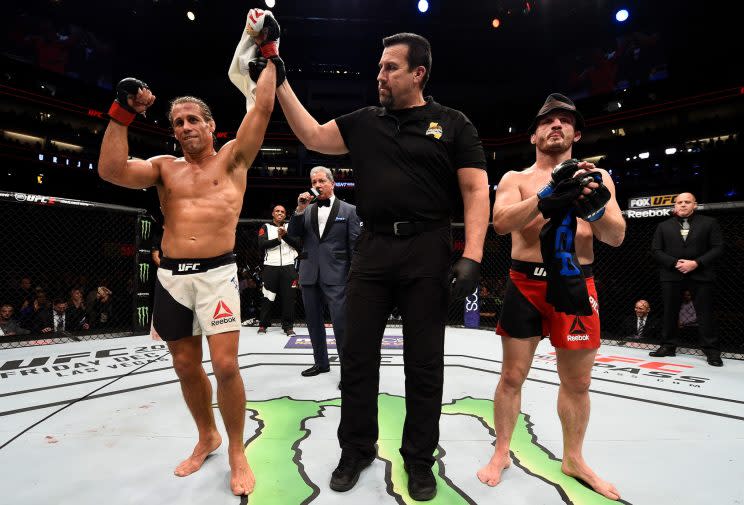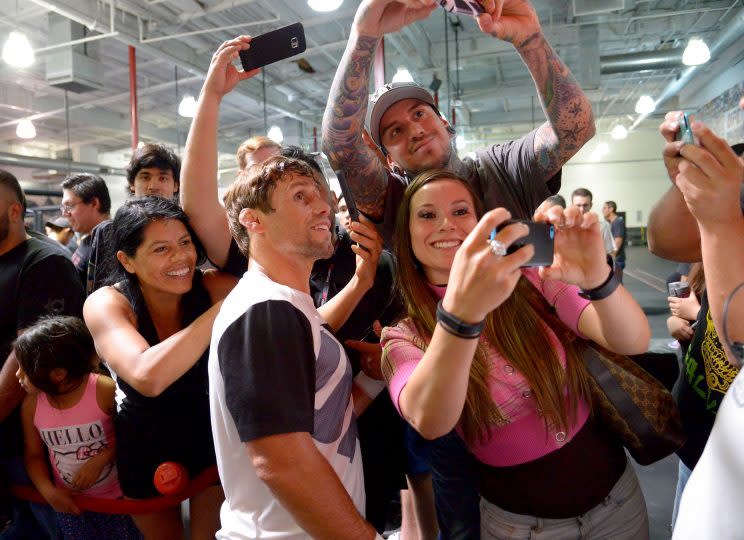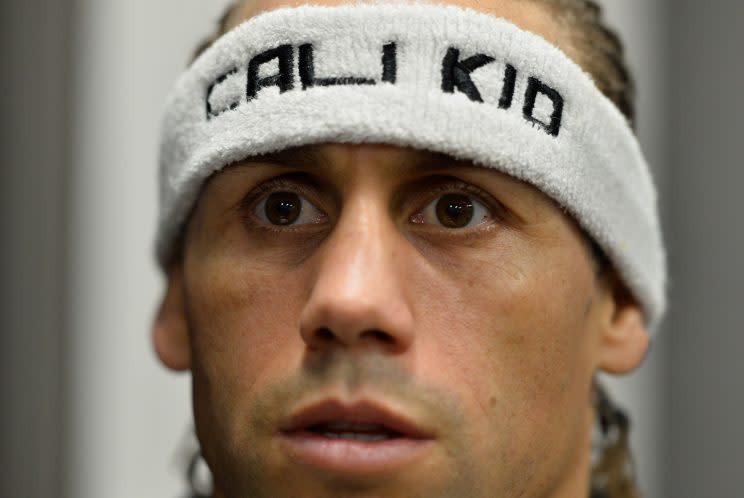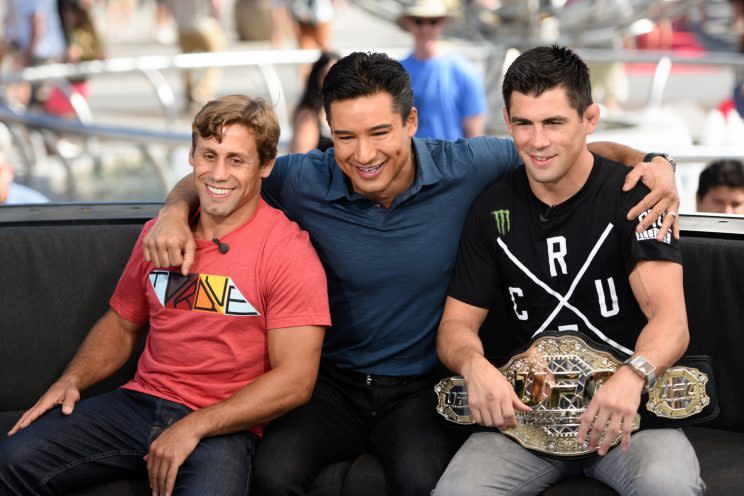Urijah Faber receives UFC Hall of Fame call, becomes its youngest member

Whenever the hit 1995 song, “California Love,” began on arena loudspeakers at mixed martial arts events over the last 13-plus years, fans would rise to hail the arrival of Urijah Faber, the California Kid.
In retirement, though, it might be best to tag him with another theme song. On the day that his election to the UFC Hall of Fame in the modern category was announced, the former World Extreme Cagefighting featherweight champion spoke incessantly about the importance of attitude.
So maybe, Faber’s retirement anthem should be Bobby McFerrin’s, “Don’t Worry, Be Happy.”
“I have an attitude of gratitude about everything,” Faber said, speaking exclusively to Yahoo Sports. “That covers everything from the money I made to doors that were opened to opportunities I’ve been given, the opportunities I may be able to provide to other guys.
“That’s important for me in the progression of whatever is next, to be really, really thankful. That in and of itself is opening a lot of doors. Just being happy is important. I don’t want to go back and say, ‘Oh, I should have done this. I should have had that. I was mistreated here.’ I understand how business works and I’m super, super fortunate to be in the position I’m in.”
The soon-to-be 38-year-old fought professionally from 2003 through 2016. He compiled a record of 34-10, and was 10-6 in the UFC and 9-3 in the WEC.
He’s probably best known as the WEC featherweight champion, but was also the King of the Cage bantamweight champion.
Notably, the UFC did not have either a bantamweight nor a featherweight division at the time Faber held those belts and they were considered the highest level available at the time.
He made five successful defenses of each title, with the five WEC defenses a promotional record.
He debuted in 2003 after a successful wrestling career at UC-Davis. At the time, MMA didn’t have widespread popularity and what attention the sport received was mostly given to either the UFC or Pride.

He would go on to be one of the most successful, and popular, fighters of his era, but he had to battle for a long while so he didn’t drown financially.
Faber said in his early days in the sport, he’d work multiple jobs and put in 17- or 18-hour days just to make enough money to survive.
It wasn’t a glamorous life, but it was what was required to get ahead.
“I’ve always been real creative in thinking outside the box and finding ways to make ends meet,” Faber said. “I’ve done everything from selling T-shirts, and probably my first three years of fighting, I was selling tickets right up until an hour before I was supposed to go out to fight. I was collecting money, giving it to the promoters and basically having to be a businessman in order to make anything happen.
“It wasn’t until the WEC was bought by Zuffa in probably 2006 or 2007, when I got my first discretionary bonus, that I started to get ahead. My first big fight was I think $7,000 to show and $7,000 to win, which was good money to me at the time. I was barely squeaking by but I was good at it at that point. And they came when I was making seven-and-seven for that first big fight and they gave me a $25,000 discretionary bonus behind the scenes.”
He laughed as he recalled the memory, because even in 2007 dollars, $39,000 wasn’t a huge amount of money for a professional athlete. But it was uncharted territory to Faber.
And it was a sign that his career was finally on the right path.
“I remember [UFC president] Dana [White] and [ex-UFC CEO] Lorenzo [Fertitta] sent me that discretionary bonus, and I was like, ‘Oh my God, this is a [expletive] load of money,’ ” Faber said. “That was the moment for me where I kind of knew that this thing was really growing and that we had a chance to make a good living at it. With Zuffa behind it and putting its marketing muscle behind me, not only did I start to make some real money by fighting, but it was when I started to get opportunities outside the cage.”
But it was his work inside the cage that made him the face of the lighter weight fighters. He was always in magnificent shape and came to fight. He had a fast-paced, aggressive style and wasn’t afraid to mix it up.
He showed his toughness in his rematch for the WEC featherweight title with Mike Brown on June 7, 2009, at WEC 41. Faber had lost his belt to Brown at WEC 36 on Nov. 5, 2008, when he was knocked out in the first.
He attempted a jumping back elbow and was caught by an overhand right.
“I was covering up and he was throwing a barrage of punches trying to finish me,” Faber said. “It was only the first round and I felt I could survive that onslaught, but they stopped it.”
After a win over Jens Pulver in his first bout back, he met Brown again, determined to get the belt.
Though he lost again, he probably made more fans by the way he fought. He dislocated a thumb in the third round, and it was extraordinarily painful. Faber, though, chose to keep fighting and was throwing elbows from a standing position at Brown.
It was that kind of competitive spirit that made him one of the sport’s most popular stars.

It didn’t hurt that he was accessible, friendly and generous with his time with his fans.
He’s eager to help develop the next generation of fighters, who have more opportunities and far better conditions than he had. He loves to mentor and provide advice, but he’s not one for excuses.
“It’s nice to have that path to mentor the next generation, but I do not feel sorry for those guys,” he said. “What is it they say about the millennials? They want everything now, they want it easy and want to go from zero to famous. I have zero compassion for a guy who says, ‘I can’t, because of this or because of that.’ I mean, I had to do everything under the sun to get ahead.
“I was coaching [wrestling] at UC-Davis for $7,000 a year. I was busing tables. I went and coached kids after that. I spent 17, 18 hours a day working my butt off. I have zero compassion for guys who have excuses. I want to share my experience and knowledge and help bring along the new generation, but I have no sympathy for anyone who says I can’t.”
If there was one thing that defined Faber as a mixed martial artist, it was these two words:
I can.
And he did, and now Urijah Faber is a UFC Hall of Famer.
He will be formally inducted on July 6 in Las Vegas during International Fight Week.


 Yahoo Sports
Yahoo Sports 

